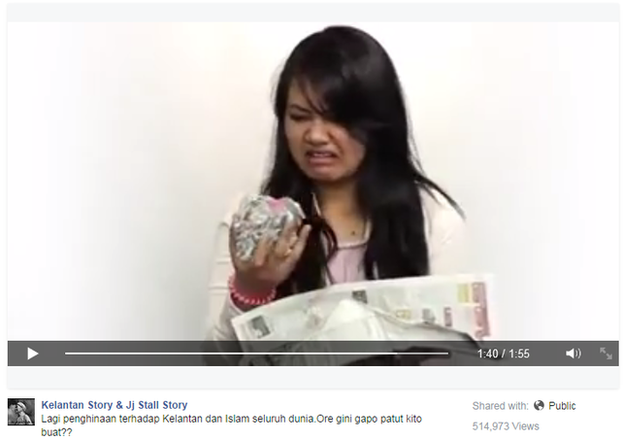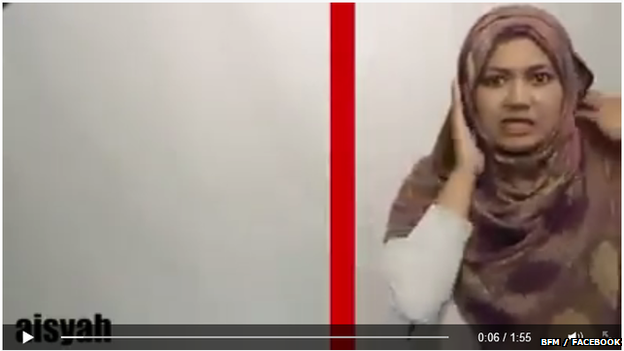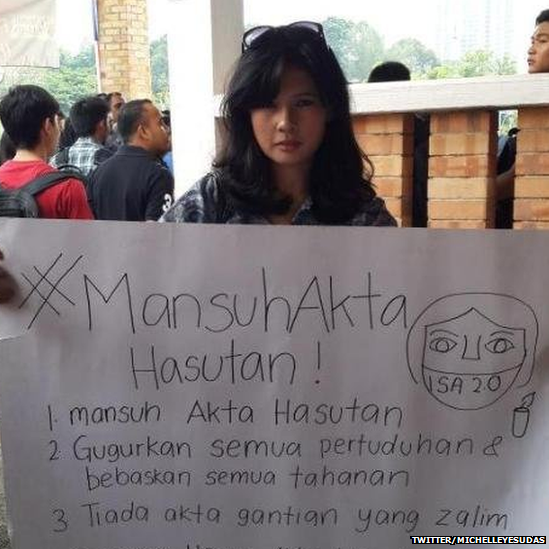The perils of speaking out against Islamic law in Malaysia
- Published

A video poking fun at an Islamic party went viral in Malaysia - but the journalist who made it is facing threats and a police investigation
A satirical video has exposed the sensitivity over Islamic law in Malaysia - as well as the limits of online speech in the country.
It was supposed to be a light-hearted poke at proposals to expand Islamic law in one state in Malaysia. But a video starring journalist Aisyah Tajuddin resulted in death and rape threats along with a police investigation.
It all began when the Pan-Malaysian Islamic Party (known by its Malay acronym PAS) proposed implementing hudud laws on Muslims in Kelantan, a mostly rural state in the northeast of the country.
Hudud laws cover prohibitions against things such as adultery, apostasy, robbery and theft, and prescribe punishments considered cruel or unusual in most Western countries: public beatings, stoning, amputation and public execution. They're also relatively uncommon in most Muslim nations with the exception of those such as Saudi Arabia or Iran which follow the most strict interpretations of Islamic sharia law.
Aisyah, a journalist with independent radio station BFM, mocked the party in a video titled "Hudud: A Rice Bowl Issue". As she crosses an imaginary border into Kelantan, a headscarf appears on her head. Finding a rock instead of rice in a packet of food, she tosses it away and shrugs, saying "Oh well, we have hudud, don't we?" and giving an ironic thumbs up. Her point? That instead of Islamic law, the PAS should be more concerned with issues such as the economy and reconstruction after severe floods in the region.

In the video, Aisyah "crosses the border" into Kelantan and finds herself involuntarily donning a headscarf
BFM Radio removed the video from its YouTube page the day after it was posted, but not before it went viral and was copied and pasted elsewhere on Facebook and YouTube. On just two of the more popular, external Facebook pages it has been viewed, external more than 780,000 times in total.
But along with the viral hit though came a huge backlash. One particularly threatening thread on Facebook started with the comment: "Those who insult the laws of Allah, their blood is halal for killing." Others came to the journalist's defence. "Making you feel offended means you can rape and kill that person....brother, do you think you need to do some self reflection and soul searching..?" commented Chiam Soon King on the Sisters In Islam Facebook page, external.
But some said the video was wrong even as they condemned the threats levelled at Aisyah. "It's still wrong to make a death threat or rape or all those barbaric acts, my point is she crossed the line and should share the blame as well. Think first," said Wan Kori.
Threats are not the end of it for the journalist - Aisyah is now being investigated by police for blasphemy, and could face up to a year in jail if convicted, external.
Sedition Act
Aisyah wasn't the only person to get caught up in the controversy. The issue touched off a row online between lawyer and activist Michelle Yesudas and the country's top policeman, Inspector General Khalid Abu Bakar.
In a series of messages, external, Yesudas demanded to know, external what Khalid would do about the threats against Aisyah. "Because I am positively terrified that these crazy, rape-frenzied people are actually the majority in my country," she wrote.
Khalid's response was to pull Yesudas into police headquarters for questioning, external under Malaysia's colonial-era Sedition Act.

Campaigner Michelle Yesudas was questioned after confronting police about the case
Human rights groups have criticised the Malaysian police's use of the act to crack down on those critical of the government. Twenty-nine people have been arrested or investigated under the law so far in 2015, compared to 23 in the whole of 2014, according to Amnesty International.
Khalid himself has tweeted that police take comments critical of Islam seriously, external and "had no choice" but to act against them. Previously he warned Malaysians, external: "Be careful about speaking about something. Don't speak words that will invite @PDRMsia [the police] to take action. Dare to speak, dare to face the consequences."
Human Rights Watch's Asia deputy director, Phil Robertson, has said Khalid "patrols the Twittersphere like a shark in open water, external", and opposition politicians have accused him of selective prosecution. Khalid has denied the accusations.
As for the implementation of hudud law - it's actually very unlikely. Kelantan's state assembly has approved the proposals, but it's doubtful that PAS has enough support to gain parliamentary approval.
Blog by Tse Yin Lee
Next story: Thousands defend Top Gear producer from abuse
Or maybe you'd like to watch: The Somali woman who's an Instagram star
You can follow BBC Trending on Twitter @BBCtrending, external, and find us on Facebook, external. All our stories are at bbc.com/trending.